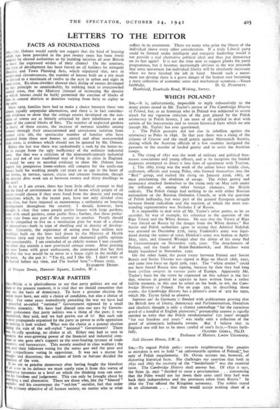WHICH POLAND ?
Sit,-It is, unfortunately, impossible to reply exhaustively to the many points raised in Mr. Taylor's review of The Cambridge History of Poland, but, as an historian who in Poland was subjected to severe attack for my vigorous criticism of the part played by the Polish aristocracy in Polish history, I am most of all entitled to deal with certain of his inaccuracies and to restate historical facts which no one (except Mr. Taylor) has ever questioned.
t. The Polish peasants did not rise in rebellion against the aristocracy as Poles in 1846. In that year there was a rising of the citizens of Cracow and the small gentry against Metternich Austria, during which the Austrian officials of a few counties instigated the peasants to the murder of landed gentry and to assist the Austrian troops.
2. The rising of 1831 was the work of military and political free- mason associations and young officers, and at its inception the landed magnates attempted to direct it into lines of agreement with Tsarism.
3. The 1863 rising was the work of the urban lower middle class, craftsmen, officials and young Poles, who formed themselves into the " Red " group, and started the rising on January 22nd, 1863, at once proclaiming the abolition of socage. The richer gentry and aristocracy attached themselves to the rising only on May loth under the influence of, among other foreign elements, the British radicals. The Polish risings had nothing to do with either Russian nationalism or the Russian Orthodox Church, or with the question of Polish latifundia, but were part of the general European struggle between liberal radicalism and the reaction, of which the most out- standing representative was Nicholas I of Russia.
It is impossible to deal with all Mr. Taylor's other points, so let us consider, by way of example, his reference to the question of the Riga Treaty and the White Armies. He says that the Treaty of Riga "was forced on Russia by the danger from the White Armies." But Soviet and Polish authorities agree in stating that Admiral Kolchak was arrested on December 27th, 1919; Yudenich's army was liqui- dated during the winter of 1919; Denikin's army was broken in April- May, 1920, and General Wrangel after the defeat of his army fled to Constantinople on November 15th, 192o. The detachments of Petlura, and the bands of Bulak-Balakhovich, and Machno were finally liquidated in November, 1920.
On the other hand, the peace treaty between Poland and Soviet Russia and Soviet Ukraine was signed at Riga on March 18th, 1921, and came into force on April 30th, 1921. The " white armies " could not have forced Russia into signing, because by then they had long been civilian emigres in various parts of Europe. Apparently Mr. Taylor's basis for the views he expressed on this subject is the fact that, whereas in general he appears to have written from a rather fallible memory, in this case he relied on the book, to wit, the Cam- bridge History of Poland. For on page 529, in describing these events, the Cambridge History has a printer's error of :922 for 192o, which Mr. Taylor failed to observe.
Sapienti sat! As Germany is flooded with publications proving that the British love of liberty, democracy and Parliamentarism, liberalism and idealistic thought is only a clumsy camouflage " for the rapacious greed of a handful of English plutocrats," presumably anyone is equally entitled to write that the Polish revolutionaries' 15o years' struggle " for our freedom and yours " was really only a reflection of the • greed of aristocratic latifundia owners. But I believe that in England one still has to be more careful of one's facts.—Yours faith- Professor of History, Lwow University, Nell Gwynn House, S.W. 3.


























 Previous page
Previous page